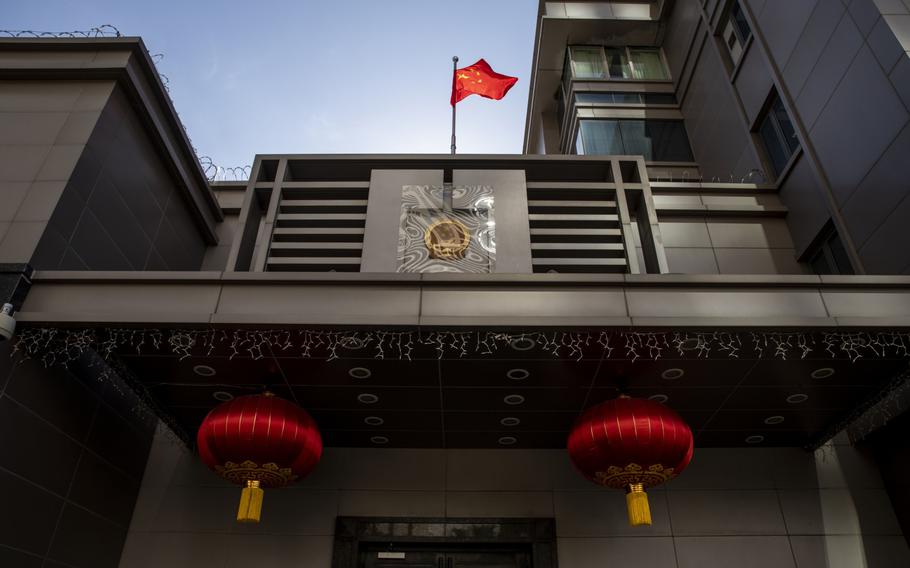
The Chinese flag is seen outside the China Consulate General building in Houston, Texas, on July 22, 2020. (Scott Dalton/Bloomberg)
The United States should bolster its ability to deter a Chinese attack against Taiwan and strengthen its oversight of Chinese companies as it faces an increasingly "triumphalist" and "aggressive" China, a bipartisan panel told Congress on Wednesday.
A 539-page report by the U.S.-China Economic and Security Review Commission — created by Congress specifically to track and anticipate threats from China — said the Chinese Communist Party's assertive behavior was likely to intensify as the country's leaders confront a gap between triumphalist rhetoric at home and challenges from growing debt to technological dependence on the U.S. and criticism of its handling of the COVID-19 pandemic.
"Regardless of how China's internal and external environments develop, the CCP's aggressive posture will likely harden further as Chinese leaders confront the tensions between their rhetoric and their challenges," the panel said. "The CCP is now likely to react in an aggressive manner either in order to defend itself against perceived threats or to press perceived advantages."
The report highlights the deep-seated tensions that remain in relations between the world's two largest economies, even as ties have begun to warm in recent weeks. On Monday, President Joe Biden and his Chinese counterpart Xi Jinping met for a virtual summit that touched on issues from the disputed island of Taiwan to trade and human rights.
The panel, created by Congress in 2000, warned that "China's increasingly coercive approach to Taiwan puts almost daily pressure on the cross-Strait status quo and increases the potential for a military crisis."
Improvements in the capabilities of China's People's Liberation Army "fundamentally transformed the strategic environment and weakened the military dimension of cross-Strait deterrence," the panel said in the new report. "Today, the PLA either has or is close to achieving an initial capability to invade Taiwan - one that remains under development but that China's leaders may employ at high risk - while deterring, delaying, or defeating U.S. military intervention."
The panel urged the U.S. to strengthen its military deterrence against a Chinese attack on Taiwan by authorizing the deployment of large numbers of anti-ship and ballistic missiles to the Indo-Pacific and "hardening" U.S. bases in the region.
The report also warned about the scale of China's nuclear buildup, which it said could be intended to support a "new strategy of limited nuclear first use." Such a strategy would "enable Chinese leaders to leverage their nuclear forces to accomplish Chinese political objectives beyond survival, such as coercing another state or deterring U.S. intervention in a war over Taiwan."
The panel's warning comes after a Pentagon report released this month said China is expanding its nuclear weapons capabilities more rapidly than previously believed and after the U.S.'s top uniformed military officer, Gen. Mark Milley, warned that China's test of hypersonic systems - including one that was launched into orbit - was close to a "Sputnik moment" for America.
The U.S. needs to continue nuclear modernization to prevent the erosion of U.S. strategic nuclear superiority, the panel said.
Other nonbinding recommendations in the report include urging the U.S. to:
— Consider comprehensive legislation to address risks to U.S. investors and interests from investments in Chinese equity, debt and derivative instruments.
— Ensure the effective implementation of the Export Control Reform Act of 2018 and the Foreign Investment Risk Review Modernization Act of 2018.
— Consider legislation to create the authority to screen the offshoring of critical supply chains and production capabilities to China, to protect U.S. national and economic security interests.
— Enact legislation expanding the jurisdiction of U.S. investment restrictions targeting Chinese entities placed on the Non-Specially Designated Nationals Chinese Military-Industrial Complex Companies List.
— Direct the Securities and Exchange Commission to require that publicly traded U.S. companies with facilities in China report on an annual basis whether there's a Chinese Communist Party committee in their operations.
— Consider comprehensive legislation to ensure Chinese entities hit with sanctions under one U.S. authority automatically face sanctions under other authorities unless a waiver is granted.
— Mandate the Treasury Department to provide an annual update of the U.S. portfolio investment position in China, including money routed through offshore centers, such as the Cayman Islands.
— Direct U.S. Customs and Border Protection to initiate action to impose a regionwide Withhold Release Order on products originating from Xinjiang.